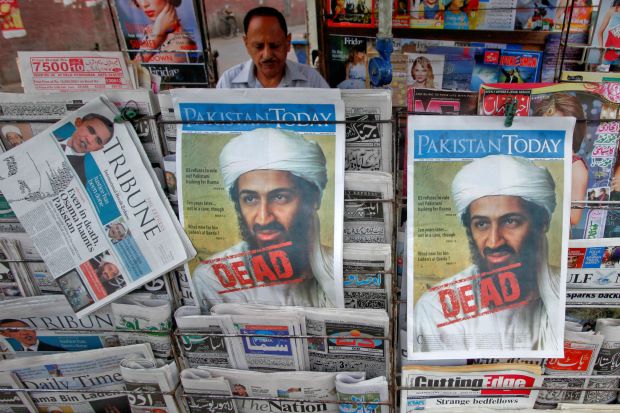Pakistan moves jailed doctor who helped track bin Laden

Pakistani prison authorities have moved the jailed doctor believed to have helped the CIA hunt down Osama bin Laden, his attorney said on Saturday, speculating it could be a prelude to his release.

The continued imprisonment of Dr. Shakil Afridi has long been a source of tension between Pakistan and the United States, which cut military aid over accusations Pakistan continues to shelter Taliban militants fighting U.S. and Afghan soldiers across the border in Afghanistan.
A jail official in the northwestern city of Peshawar told Reuters on condition of anonymity that Afridi had been transferred to Adiala prison in Rawalpindi, near the capital Islamabad, but said the reasons were unclear and could simply be security-related.
Afridi’s lawyer, Qamar Nadeem, confirmed the transfer of his client but said he was not sure where he was now. Judicial officials could not be reached on Saturday, nor could embassy officials for the United States, which has for years called on Pakistan to release Afridi.
Afridi was accused of treason after word spread he had helped the CIA collect genetic samples of the bin Laden family, paving the way for a U.S. Navy SEAL raid in 2011 in the town of Abbottabad that killed the al Qaeda leader accused of plotting the Sept. 11, 2001 attacks on the United States that killed nearly 3,000 people.
He was arrested days after the U.S. operation – which Pakistan called a violation of its sovereignty – and charged with aiding terrorists.
Afridi was sentenced to 23 years’ jail for financing terrorism. That conviction was overturned in 2013, but he is still serving time for other terrorism-related convictions, his lawyer said.
He also faced a murder trial related to the death of a patient more than a decade ago.
However, the layer said Afridi had recently had his latest sentence reduced to seven years in a clemency action, and had served about that amount of time already.
“So I think he can be released very soon,” Nadeem told Reuters.
FILE PHOTO: A police officer walks past Central Jail in Peshawar June 21, 2012. REUTERS/Fayaz Aziz/File Photo
There were no other immediate indications of any release in the works, however.
A U.S. State Department official, speaking on the condition of anonymity, called on the Pakistani government to ensure Afridi’s safety.
“We are aware of reports that Dr. Afridi has been transferred to another prison, and call on the Government of Pakistan to take all necessary measures to ensure Dr. Afridi’s safety,” the official said.
“We don’t have anything else at this time and would refer you to the government of Pakistan as to the reasons for his transfer,” the official added.
In January 2017, Pakistan’s then-law minister said the country would not release Afridi under any U.S. pressure.
“Afridi worked against the law and our national interest, and the Pakistan government has repeatedly been telling the United States that under our law he committed a crime and was facing the law,” Zahid Hamid was quoted as saying at the time.
SOURCE: REUTERS